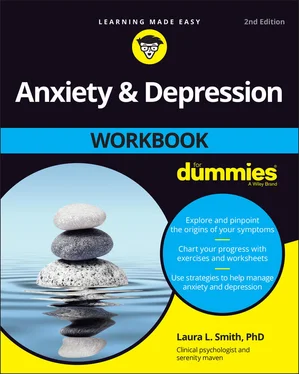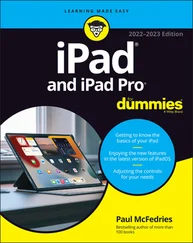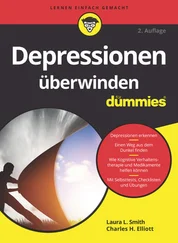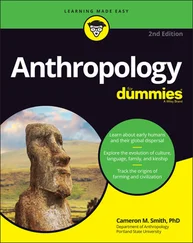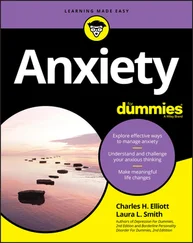Laura L. Smith - Anxiety and Depression Workbook For Dummies
Здесь есть возможность читать онлайн «Laura L. Smith - Anxiety and Depression Workbook For Dummies» — ознакомительный отрывок электронной книги совершенно бесплатно, а после прочтения отрывка купить полную версию. В некоторых случаях можно слушать аудио, скачать через торрент в формате fb2 и присутствует краткое содержание. Жанр: unrecognised, на английском языке. Описание произведения, (предисловие) а так же отзывы посетителей доступны на портале библиотеки ЛибКат.
- Название:Anxiety and Depression Workbook For Dummies
- Автор:
- Жанр:
- Год:неизвестен
- ISBN:нет данных
- Рейтинг книги:4 / 5. Голосов: 1
-
Избранное:Добавить в избранное
- Отзывы:
-
Ваша оценка:
- 80
- 1
- 2
- 3
- 4
- 5
Anxiety and Depression Workbook For Dummies: краткое содержание, описание и аннотация
Предлагаем к чтению аннотацию, описание, краткое содержание или предисловие (зависит от того, что написал сам автор книги «Anxiety and Depression Workbook For Dummies»). Если вы не нашли необходимую информацию о книге — напишите в комментариях, мы постараемся отыскать её.
Anxiety and Depression Workbook For Dummies
Anxiety and Depression Workbook For Dummies — читать онлайн ознакомительный отрывок
Ниже представлен текст книги, разбитый по страницам. Система сохранения места последней прочитанной страницы, позволяет с удобством читать онлайн бесплатно книгу «Anxiety and Depression Workbook For Dummies», без необходимости каждый раз заново искать на чём Вы остановились. Поставьте закладку, и сможете в любой момент перейти на страницу, на которой закончили чтение.
Интервал:
Закладка:
Finally, illegal drugs such as cocaine, heroin, methamphetamine, ecstasy, and so on are sometimes taken to alter moods. In the short run, they accomplish that goal; but in the long run, they almost inevitably worsen mood problems.
Marijuana, legal in many states, has strong psychoactive qualities. Some people use marijuana to alleviate emotional distress and anecdotally report success. A few early studies suggest that for depressed and anxious people, cannabis may improve moods and decrease anxiety. However, empirical research studies have not been widely conducted to verify its usefulness for this purpose.
Physical illnesses or injuries (especially head trauma) can also produce symptoms of anxiety or depression. Not only can the illness itself cause mood problems, but worry and grief about illness or injury can contribute to your distress. If you’ve been diagnosed with a medical condition, check with your doctor to see if your depression or anxiety is related to that condition. Jot down any possible physical reasons for your anxiety or depression in Worksheet 2-2.
Worksheet 2-2Physical Possibilities
Plotting Out a Lifeline
The sadness and angst you feel today may have sprouted from seeds planted in your past. Therefore, exploring your personal history provides clues about the possible origins of your problems. The exercise in this section, called the Emotional Origins form, takes a little time.
The Emotional Origins exercise makes you revisit your childhood by asking questions about your parents or other caregivers and your childhood experiences. Some of the memories involved may evoke powerful emotions; if you start to feel overwhelmed, you may want to stop the exercise and consult a mental health professional for guidance and support.
Filling out this form is a lot easier after you look over an example. Here’s an example of how Tyler filled out his Emotional Origins form.
 Tylersuffers from many physical signs of depression, such as lack of energy and increased appetite. He has little insight as to the origins of his depression. His physician refers him to a social worker, who suggests he fill out an Emotional Origins form (see Worksheet 2-3) to examine his childhood experiences.
Tylersuffers from many physical signs of depression, such as lack of energy and increased appetite. He has little insight as to the origins of his depression. His physician refers him to a social worker, who suggests he fill out an Emotional Origins form (see Worksheet 2-3) to examine his childhood experiences.
Worksheet 2-3Tyler’s Emotional Origins
| Questions About Your Caregivers 1. Who were the primary caregivers in my childhood, and what were they like? Describe their personalities.My mother was self-centered and rarely thought much about what my sister and I needed. When things didn’t go her way, she exploded. She was domineering and incredibly uptight. She was a perfectionist who talked about the “right way” or the “wrong way” to do things. I also remember that she always acted like a martyr. Everyone liked my dad because he was funny and friendly. But I don’t really remember him joking that much with me. He mainly criticized me because I was clumsy and didn’t like to go hunting with him. My parents divorced when I was 11 years old. When I was in high school, my mother had a boyfriend who lived with us. He was nice, but we really didn’t hit it off. I think I was sort of jealous of the attention my mother gave him. 2. How was love and affection expressed by each caregiver?Neither of my parents ever said, “I love you,” and I can’t remember getting hugs from them. I always saw other families hug each other, and that made me feel awkward. As an adult, I still feel weird in social situations when people greet each other with hugs. My mother would tell other people how much she loved her kids, but it seemed like she was talking about some other kids, not my sister and me. She wanted everyone to think that she was the perfect mother, wife, and homemaker. It was all about her. Like I said before, my father was friendlier to other people than to me. He seemed to care about himself more than his family. I never said “I love you” to either of my parents. Now they’ve both passed away, and I feel guilty that I never said those words to them. I do realize why it was so hard for me to tell them when they never told me either. 3. How was conflict expressed and resolved?My parents fought a lot. We could hear them at night — my sister and I would be scared. They used horrible words that we’d never hear them say to us or anyone else. When they were in public, though, it was as if everything was perfect. My father just stayed away from the house. He said he was working, but now I know he was cheating on my mother. They divorced when I was in 6 thgrade. There were never any arguments between my parents and me. I just shut up and let them talk. We didn’t talk about politics or current events. It wasn’t until I was in college that I realized how little I knew about the world. 4. What did I get in trouble for?I was quiet and mostly stayed out of trouble. A few times I remember my mother screaming at me about something small, like when I forgot to pick up a wet towel in the bathroom. My father would make fun of my clumsiness. He’d blow up and call me stupid when I couldn’t do a household project. I still get nervous when I try to fix something at home. As long as I wasn’t getting bad grades or getting caught doing something I shouldn’t, no one at home seemed to notice me. My best friend and I started stealing alcohol from the liquor cabinet when I was in high school. My mom and her boyfriend never asked me about it. As soon as I went away to college, I was completely on my own. 5. How was I disciplined?Other than occasionally getting screamed at, I don’t think there was much discipline. Like I said, I was a pretty quiet kid who didn’t make waves. 6. Were my caregivers critical or supportive?I was really a good student, but I don’t remember my parents being very supportive of that. Other than getting yelled at by my dad for not being good at fixing stuff, it’s like I didn’t exist. 7. Does anything else important about my caregivers come to mind, whether positive or negative?My mother never seemed happy or satisfied. She never got over her divorce and complained about her cheating husband until the day she died. My father married a woman who was only a few years older than I am. I rarely saw him or his new wife after that. Looking back, my whole family was kind of sad. Questions About Your Household 1. What were my earliest memories?I don’t remember much from when I was a little kid. My grandfather used to take us horseback riding. That was fun. I remember my father and my grandparents having a big fight over money. That was scary. 2. What were my best memories of childhood?Riding my bike with my friend during summer vacation. We used to pack a lunch and take off in the morning and explore the neighborhood. We’d stop at a drug store and pick up sodas and sit in some park to eat. I don’t really remember what we talked about, but it was great to feel free and independent. 3. What were my worst memories of childhood?Definitely listening to my parents fighting. I felt so afraid and helpless. My parents also had fights with my grandparents. I realize now that my grandparents financed a part of my parents’ lifestyle. When my grandparents didn’t approve of some purchase, there were huge arguments. My sister and I were told to disappear, but we always stayed close by. 4. What adults spent time with me, and what did we do?I grew up in a household where children were to be seen but not heard. I know that sounds like a cliché, but it’s the truth. Everything revolved around my parents. We did take a vacation for two weeks every summer to the same cabin on a lake. Often my mother would be there during the week, and my dad would come out on the weekends. My parents had friends who rented cabins close by. So basically, all the kids would hang out together, and the parents would sit around talking or playing cards. I can’t recall doing anything with an adult for fun. Oh, except for the two times my dad took me hunting and I was scared to death. I couldn’t shoot straight and hated the thought of killing animals, so he never took me again. 5. Were there others in the household (siblings, relatives, or others) who influenced me?I looked up to my older sister, but she didn’t want anything to do with me after she went to junior high school. I think my parents favored her — at least my dad did. I never felt like I measured up to her. Over the years, my sister and I didn’t have much of a relationship. We saw each other when my parents died. I went to her kids’ weddings, but we didn’t really connect. My mom’s boyfriend never paid attention to me at all. They broke up when I was in college, and I haven’t heard from him since. He didn’t influence me at all. 6. Were there special circumstances (for example, illness, trauma, death, divorce, military service, etc.)?Nothing really. To the outside world, we seemed like a pretty typical family with no particular problems until the divorce. My mother talked constantly about how awful my father was. When I was in college, she’d call me to tell me how lonely she was and how she couldn’t stand being alive. That was a horrible, frightening burden on me. I was terrified she was going to kill herself. 7. Does anything else important come to mind, whether positive or negative?I don’t think I knew how to be a good father or husband in part because I had no role model for what that looked like. During my marriage, I worked long hours, and after the first couple of years I didn’t really pay attention to my wife or the kids. It took me years to understand why my wife divorced me. Questions About School and the Neighborhood 1. Where did I live, and what was my house like? Did I have my own room? What were the conditions like?I grew up in a small suburban house. I had my own room, but there was only one bathroom. It seemed fine at the time. When I was about 9, we moved to a bigger house, and I realized how small the first house was. Looking back, I think my grandparents helped my parents buy the new house. There was a lot more fighting after we moved, and a lot of times, I heard my mother yelling about my father needing to pay my grandparents back. 2. What was my neighborhood like? Was it safe? Were there places I could go outside and play? Were there things to do close by?It was ordinary, but I now realize it was also completely composed of white families. I had no idea what diversity was about. I never heard about crime and didn’t know what to think about occasional racist comments I’d hear from others. There was a small shopping center within walking distance, and the school had an open playground we could use any time on the weekends. 3. Did I participate in any extracurricular activities, such as sports or clubs? Was that a positive experience?I started in boy scouts when I was little and got all the way through to Eagle Scout. I was proud of that. My mother came to the ceremony, but my dad didn’t. He said he had to work. I was a long-distance runner in high school. I couldn’t play basketball or baseball because I was so clumsy. 4. What do I remember about grade school? (Was I happy; what did I think about myself; how did I do in school; what were my friendships like; were there any important events?)I remember being really shy. I had a few good friends, but they were sort of nerds like me. I was a good student. 5. What do I remember about middle school or junior high school? (Was I happy; what did I think about myself; how did I do in school; what were my friendships like; were there any important events?)I was even shyer then. I felt clumsy and awkward all the time. I was also taller than all my friends by the seventh grade. I didn’t get invited to parties much. I wasn’t very happy. If I got upset, my mother sometimes would do some of my homework for me. Then she’d make me feel guilty about it. 6. What do I remember about high school? (Was I happy; what did I think about myself; how did I do in school; what were my friendships like; were there any important events?)I had a few more friends then and started dating some. I got pretty down when a girl jilted me. I remember staying in my room for hours at a time. I realize now that I didn’t know how to handle my emotions very well — when I didn’t know what else to do, I’d just withdraw. I worked just hard enough to get Bs, but I know I could have done much better in school. 7. What did I do after high school?I went to college because all my friends planned to do the same. It wasn’t something my parents cared about, but I always assumed it was something I should do. I didn’t have any particular goals or interests at first. I got good grades in chemistry, and that is what started my interest in chemical engineering. 8. Were there any historical or cultural events during my childhood that had an impact on my development?I remained on the sidelines about politics at first when I went to college, but I had strong feelings about the issues. I was too shy to assert my thoughts for quite a while. During my college years I learned quite a bit about the world that my limited experiences as a kid in the suburbs did not prepare me for. 9. What are the major events of my adulthood, such as trauma or winning the lottery?I graduated from college, got married, and had a couple of kids. My divorce after 14 years of marriage came as a shock, but I got through it okay. 10. What did this exercise teach me about the origins of my anxiety or depression?When I think back on my childhood, I realize it wasn’t very happy. My dad didn’t seem to care much about me. My mother cared more, but she was like an emotional roller coaster. I just shut down, and I think I’ve had that tendency my whole life. Maybe I’m shutting down now, too; it’s what I do when I’m unhappy. I guess I realize that I’m not totally to blame for my problems. It sort of makes sense that I shut down whenever I face possible rejection or criticism or when someone gets angry with me. |
After completing the Emotional Origins form, Tyler has a better understanding of why he copes with stress the way he does. He sees that there’s a reason he shuts down when facing certain types of situations. The exercise isn’t about blame and faultfinding; rather, it helps Tyler forgive himself for being the way he is. These insights start him on the path toward a new beginning.
Читать дальшеИнтервал:
Закладка:
Похожие книги на «Anxiety and Depression Workbook For Dummies»
Представляем Вашему вниманию похожие книги на «Anxiety and Depression Workbook For Dummies» списком для выбора. Мы отобрали схожую по названию и смыслу литературу в надежде предоставить читателям больше вариантов отыскать новые, интересные, ещё непрочитанные произведения.
Обсуждение, отзывы о книге «Anxiety and Depression Workbook For Dummies» и просто собственные мнения читателей. Оставьте ваши комментарии, напишите, что Вы думаете о произведении, его смысле или главных героях. Укажите что конкретно понравилось, а что нет, и почему Вы так считаете.
